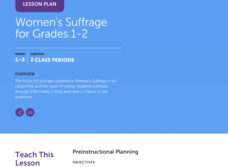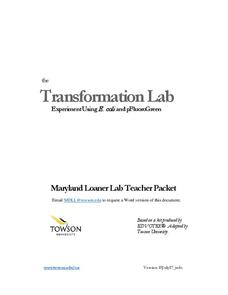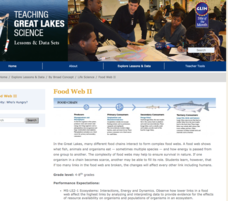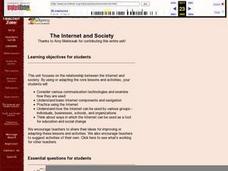Curated OER
Book Discussions via Web 2.0
Students discuss books they read via web 2.0. and create a wiki and podcast that will present the audience with their select a book by a popular teen author and write a short script about the book. Students and type the critic of the...
Curated OER
Sheryl Crow and Willie Nelson - Lesson 1
Appeal to your music lovers with this lesson. Middle and high schoolers listen to and describe music from contrasting styles. They identify the common elements between gospel and bluegrass music and have a class discussion regarding the...
Curated OER
Discussion Guide for The Catcher in the Rye
Is Holden Caulfield a trustworthy narrator? Groups work together to find evidence in The Catcher in the Rye to support a yes or no stance.
TED-Ed
The Silk Road: Connecting the Ancient World Through Trade
Introduce learners to The Silk Road, the first world-wide web. The narrator of this short, animated video traces the pioneers of globalization and the impact they had on culture and economy. The Scythians, Darius the First, and Alexander...
Curated OER
Finding Meaning in the Badge
Children who are three to five years old study two rank badges from the Qing dynasty to develop an understanding of social rank, language skills, and symbolism. The lesson is discussion-based and requires learners to compare and contrast...
Scholastic
Women's Suffrage for Grades 1–2
Scholars take part in a grand conversation after they examine facts and stories about the Women's Suffrage Movement. Eight discussion questions bring light to influential women, the importance of voting, citizenship, and voting rights.
Compton Unified School District
How Can We Locate Places?
How can we locate places? Maps, of course! Expose second graders to the tools available in maps and discuss how these tools can help people find locations. Students also look at communities, including what makes a community and the...
Towson University
Transformation Lab
Transform your class' understanding of genes and antibiotic resistance with the Transformation Lab. Junior geneticists create and observe their own resistant strains of E. coli through research, discussion, and experimentation. The...
Curated OER
Evernote
Here is an app version of a powerful tool that allows you and your students to have one place where you can capture, organize, and share items in multiple media formats. The different uses for this app are as varied as your ideas and...
Curated OER
Scaling it Down: Caves Have Maps, Too
Measurement and map skills are the focus of this lesson, where learners crawl through a "cave" made out of boxes, desks and chairs, observing the dimensions. Your young geographers measure various aspects of the cave and practice math...
Michigan Sea Grant
Food Web II
A food web consists of complex food chains and the more complex the web, the better likelihood of survival. Learners compare and contrast food webs and food chains and discuss concepts like the predator-prey and consumer-producer...
Curated OER
Charlotte's Web
Students complete a variety of activities related to the book "Charlotte's Web" by E.B. White. They create a comic strip based on the characters, setting, and plot of the story, and examine the author's writing process. In small groups...
Curated OER
Probability in Daily Life
Sixth graders examine the use of probability in daily life. In this probability lesson, 6th graders listen to scenarios from Louis Sachar's, Holes, after discussing probability in everyday life. They pretend they are detectives who are...
Curated OER
Structured Academic Controversy (SAC) in the History Classroom
SAC is a specific approach to discussing history and controversial issues. Rather than adhering to an either/or debate-style paradigm, it fosters speaking and constructivist listening to enable learners to build consensus through...
Curated OER
The Internet and Society
Learners consider the impact of the Internet on society, information, and communication. They practice using the Internet through a variety of web searches, information gathering activities, and Internet communication. A class discussion...
August House
Anansi Goes to Lunch - Kindergarten
Greed is the theme of the West African folktale, Anansi Goes to Lunch and this multidisciplinary collection of lessons. First, scholars listen to a read aloud and participate in a grand conversation about the book's key details and...
Planet e-Book
David Copperfield
Don't let the length scare you away. An eBook version of David Copperfield contains all 1,307 pages of the story. This digital version of the classic coming-of-age novel follows the title character from childhood into adulthood, giving...
Curated OER
Anansi and the Tug O' War
Read a short book with your first graders! Anansi and the Tug O' War is the focus of this lesson. After reading the African story together, they complete language arts activities to practice reading comprehension. A stellar group of...
Curated OER
A Whale of Importance to the Arctic People
The bowhead whale of the Arctic region is of great importance to the people that live there. Your class will brainstorm all they know about this wonderful whale and create an informational video, which they will share with the children...
Curated OER
Sustainability and Extinction
Galapagos Penguins are the only penguins on earth that live north of the equator (in the wild). In this last lesson plan a discussion on how the Galapagos islands developed their populations and diversity sparks the introduction. Two...
Curated OER
Charlotte's Web
Fourth graders focus on fluency by reading the book Charlotte's Web. In this reading strategies lesson plan, 4th graders partner read, do guided reading, and independent reading to increase fluency. Students use Venn Diagrams, discuss...
Curated OER
Food Chains & Food Webs
Tenth graders examine how energy is lost through different trophic levels. In this trophism activity students construct a food web and view a video.
Curated OER
Lessons: Food Web
Learners use an interactive web-based food web game to gain familiarity with tropic levels and interactions. They already understand that in an ecosystem there are four basic tropic levels: producers, primary consumers, secondary...
Curated OER
Weave an Aquatic Food Web
Students explore organisms that are part of interconnected food webs. In this food web lesson, students choose an animal and research what the animal eats. Students begin with the food chain and branch out into the interconnected web...

























